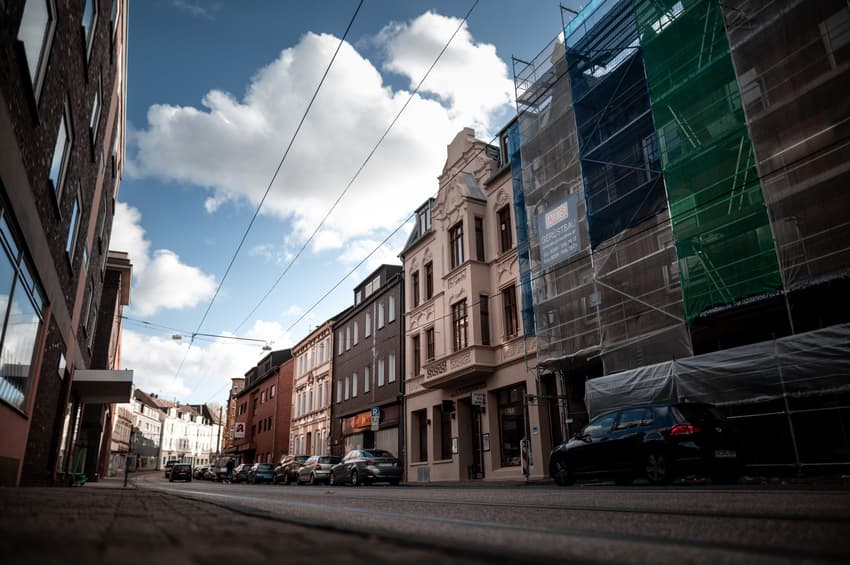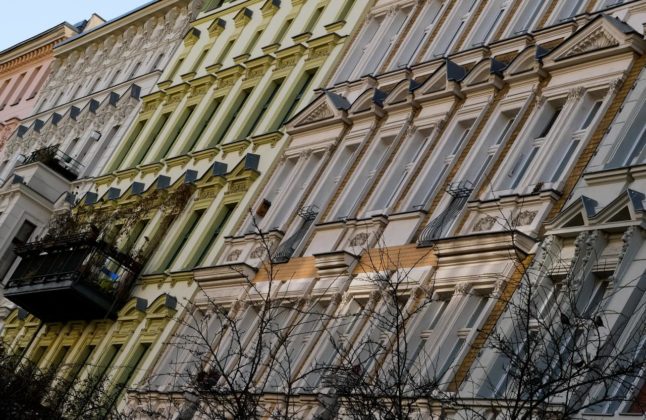'No end in sight': Why is it so hard to find housing in Germany right now?

A new study has shined light on the biggest challenges facing both renters and buyers in Germany - and why these obstacles arose in the first place.
Looking to move? Find your next rental apartment here.
High demand for living space, sluggish new construction, hesitant real estate buyers: According to a new study, the pressure on the housing market in German cities has increased significantly over the last year.
In the first half of 2023, asking rents in Berlin, Hamburg, Munich, Cologne, Frankfurt, Düsseldorf, Stuttgart and Leipzig rose by an average of 6.7 percent, according to an analysis by real estate specialist Jones Lang LaSalle (JLL) published on Tuesday.
In the same period of the previous year, the increase in rents in these eight major German cities stood at 3.7 percent.
Asking rents rose particularly sharply in Berlin and Leipzig, where double-digit percentage increases were recorded.
The price spike can be explained in part due to demand versus availability: in Berlin, there was net immigration of 86,000 people in 2022, while just over 17,000 apartments were completed, meaning that the capital's housing market is getting tighter and tighter, JLL explained.
In addition, people with cheap tenancy agreements shy away from moving. "This increases the pressure on the few flats that become available.”
Rent increases were much more moderate in the other major cities, and advertised rents even fell slightly in Stuttgart.
As a whole, rental flats in Germany’s eight major cities were offered at an average of €15.38 per square metre, around 50 percent more expensive than in urban districts (€10) and 79 percent more expensive than in the rural districts (€8.61).
READ ALSO: Why Germany is seeing ‘the worst housing shortage in 20 years’
‘No end in sight’
Asking rents - or Angebotsmiete in German - don’t always mean the final price, as sometimes the prospective tenant can negotiate. However, this is far less common among renters than buyers, especially when many landlords have the upper hand in a tight market, according to the report.
"In all the metropolises considered, there is an enormous shortage of supply, which will be exacerbated by the faltering housing construction," said JLL residential real estate expert Roman Heidrich. "There is therefore no end in sight to the rent increases."
READ ALSO: EXPLAINED: How rents are changing in Germany’s five largest cities
The Association of German Pfandbrief Banks and the Institute of the German Economy (Ifo) have also seen growing pressure on the rental market in recent months, which is being exacerbated by the influx of Ukrainian refugees, they said.

Rental properties in Berlin's Prenzlauer Berg district. Photo: picture alliance/dpa/dpa-Zentralbild | Jens Kalaene
In addition, residential construction is faltering. According to the Ifo Institute, many projects are being cancelled due to the rise in interest rates and high construction prices, and the German government's target of 400,000 new flats per year is considered unattainable.
Associations of the housing and construction industry expect only about 245,000 completions this year.
"Since the population is growing due to immigration, most recently by more than one million people in 2022, this new construction is not enough," the Federal Association of Banks stated on Tuesday.
"Accordingly, the pressure on the rental market is increasing."
Is there a better situation for buyers?
But the analysis showed that housing prices, on the contrary, are going down in most major cities.
According to JLL, asking prices fell by seven percent in the first half of the year, compared to an increase of 7.5 percent in the same period last year.
While residential real estate in Berlin has become slightly more expensive, there have been significant declines in all other metropolises - most notably in Munich, Stuttgart and Düsseldorf.
In the metropolises, prices had risen sharply during a long real estate boom, which is now nearing an end, explained the analysis. Residential real estate prices in Germany have been falling for months.
According to JLL, prices recently dipped significantly less in the urban districts (-5.2 percent) and rural districts (-2.2 percent).
According to the Federal Statistical Office, they dipped by 6.8 percent in the first quarter compared to the same quarter of the previous year. Figures for the second quarter are still pending.
Increased interest rates on loans are also preventing prospective buyers from buying real estate and instead pushing them into the rental market, it said.
READ ALSO: The German regions where housing prices and rising (and falling) the most
Comments
See Also
High demand for living space, sluggish new construction, hesitant real estate buyers: According to a new study, the pressure on the housing market in German cities has increased significantly over the last year.
In the first half of 2023, asking rents in Berlin, Hamburg, Munich, Cologne, Frankfurt, Düsseldorf, Stuttgart and Leipzig rose by an average of 6.7 percent, according to an analysis by real estate specialist Jones Lang LaSalle (JLL) published on Tuesday.
In the same period of the previous year, the increase in rents in these eight major German cities stood at 3.7 percent.
Asking rents rose particularly sharply in Berlin and Leipzig, where double-digit percentage increases were recorded.
The price spike can be explained in part due to demand versus availability: in Berlin, there was net immigration of 86,000 people in 2022, while just over 17,000 apartments were completed, meaning that the capital's housing market is getting tighter and tighter, JLL explained.
In addition, people with cheap tenancy agreements shy away from moving. "This increases the pressure on the few flats that become available.”
Rent increases were much more moderate in the other major cities, and advertised rents even fell slightly in Stuttgart.
As a whole, rental flats in Germany’s eight major cities were offered at an average of €15.38 per square metre, around 50 percent more expensive than in urban districts (€10) and 79 percent more expensive than in the rural districts (€8.61).
READ ALSO: Why Germany is seeing ‘the worst housing shortage in 20 years’
‘No end in sight’
Asking rents - or Angebotsmiete in German - don’t always mean the final price, as sometimes the prospective tenant can negotiate. However, this is far less common among renters than buyers, especially when many landlords have the upper hand in a tight market, according to the report.
"In all the metropolises considered, there is an enormous shortage of supply, which will be exacerbated by the faltering housing construction," said JLL residential real estate expert Roman Heidrich. "There is therefore no end in sight to the rent increases."
READ ALSO: EXPLAINED: How rents are changing in Germany’s five largest cities
The Association of German Pfandbrief Banks and the Institute of the German Economy (Ifo) have also seen growing pressure on the rental market in recent months, which is being exacerbated by the influx of Ukrainian refugees, they said.

In addition, residential construction is faltering. According to the Ifo Institute, many projects are being cancelled due to the rise in interest rates and high construction prices, and the German government's target of 400,000 new flats per year is considered unattainable.
Associations of the housing and construction industry expect only about 245,000 completions this year.
"Since the population is growing due to immigration, most recently by more than one million people in 2022, this new construction is not enough," the Federal Association of Banks stated on Tuesday.
"Accordingly, the pressure on the rental market is increasing."
Is there a better situation for buyers?
But the analysis showed that housing prices, on the contrary, are going down in most major cities.
According to JLL, asking prices fell by seven percent in the first half of the year, compared to an increase of 7.5 percent in the same period last year.
While residential real estate in Berlin has become slightly more expensive, there have been significant declines in all other metropolises - most notably in Munich, Stuttgart and Düsseldorf.
In the metropolises, prices had risen sharply during a long real estate boom, which is now nearing an end, explained the analysis. Residential real estate prices in Germany have been falling for months.
According to JLL, prices recently dipped significantly less in the urban districts (-5.2 percent) and rural districts (-2.2 percent).
According to the Federal Statistical Office, they dipped by 6.8 percent in the first quarter compared to the same quarter of the previous year. Figures for the second quarter are still pending.
Increased interest rates on loans are also preventing prospective buyers from buying real estate and instead pushing them into the rental market, it said.
READ ALSO: The German regions where housing prices and rising (and falling) the most
Join the conversation in our comments section below. Share your own views and experience and if you have a question or suggestion for our journalists then email us at [email protected].
Please keep comments civil, constructive and on topic – and make sure to read our terms of use before getting involved.
Please log in here to leave a comment.